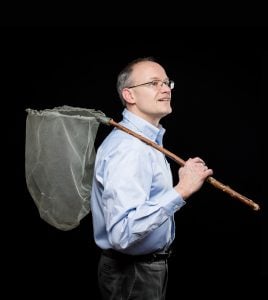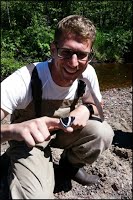Several undergraduate students working in biology research laboratories presented at Michigan Tech’s 2017 Undergraduate Research Symposium this year. The event highlights the amazing cutting-edge research being conducted on our campus by some of our best and brightest undergraduate students!
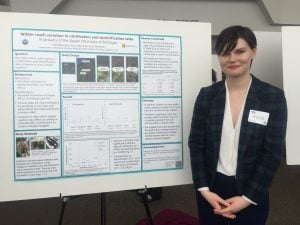
Michelle Kelly from Amy Marcarelli’s laboratory challenged the assumption that variation of biological nitrogen transformation rates within streams are small. Her findings suggest that these rates can actually significantly vary and may not be estimated by a single study site per reach. Michelle’s research was funded by a Research Experience for Undergraduates through the National Science Foundation.
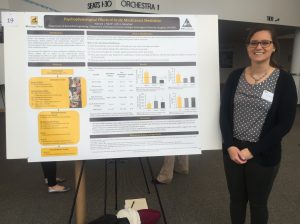 Hannah Marti from John Durocher’s laboratory explored the potential health benefits of acute mindfulness meditation. In her pilot study, she observed a reduction in anxiety, heart rate, and aortic pulse pressure after the one introductory hour of mindfulness mediation. Hannah’s research was funded through the Undergraduate Research Internship Program sponsored by the Portage Health Foundation. Hannah earned an honorable mention for her presentation!
Hannah Marti from John Durocher’s laboratory explored the potential health benefits of acute mindfulness meditation. In her pilot study, she observed a reduction in anxiety, heart rate, and aortic pulse pressure after the one introductory hour of mindfulness mediation. Hannah’s research was funded through the Undergraduate Research Internship Program sponsored by the Portage Health Foundation. Hannah earned an honorable mention for her presentation!
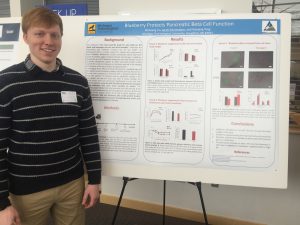
Jacob Schoenborn from Xiaoqing Tang’s laboratory studied mice to understand the influence of blueberries on the function of pancreatic beta cells, which regulate the amount of glucose in the blood. His results suggest that the bioactive substances in blueberries can improve beta cell sensitivity. Jacob’s research was funded through the Undergraduate Research Internship Program sponsored by the Portage Health Foundation. Jacob earned an honorable mention for his presentation!
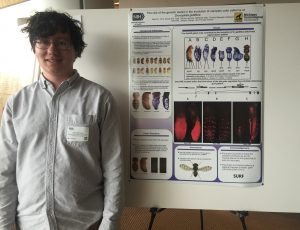 David Trine from Thomas Werner’s laboratory reviewed the abdominal pigment pattern of Drosophila guttifera by through five toolkit genes. His findings will help to understand the evolutionary process of color patterns on animals and also may lead to future cancer research. David’s research was funded through a Summer Undergraduate Research Fellowship.
David Trine from Thomas Werner’s laboratory reviewed the abdominal pigment pattern of Drosophila guttifera by through five toolkit genes. His findings will help to understand the evolutionary process of color patterns on animals and also may lead to future cancer research. David’s research was funded through a Summer Undergraduate Research Fellowship.
